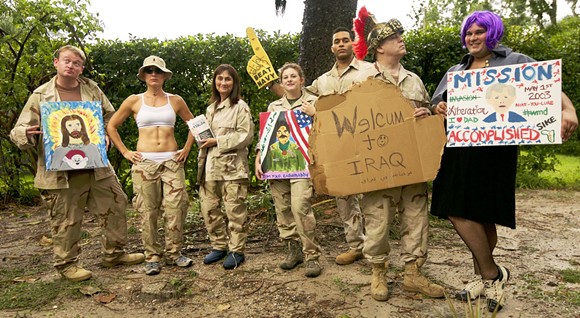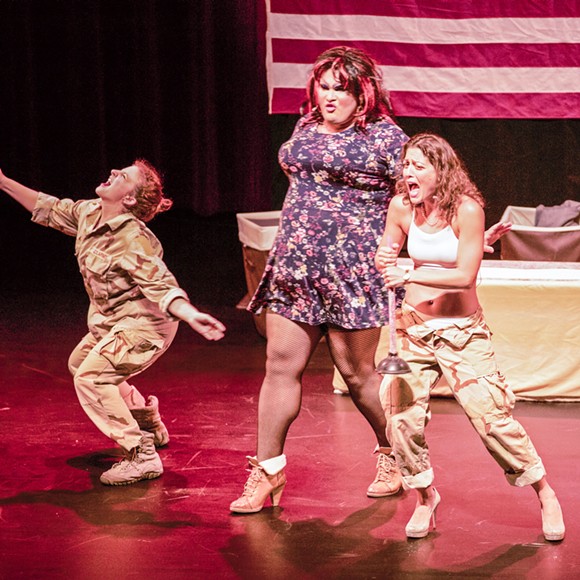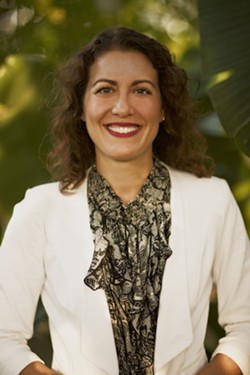WHAT DOES an American hero look like? Picture them in your head—what’s their gender, their ethnicity, their sexual orientation, their religious affiliation?
Chances are, you’re picturing a Captain America lookalike, and not just because you’re a Marvel fan.
“I think there’s this standard of the all-American hero and it’s a white, heterosexual, extroverted, macho, muscle-bound, conservative Christian and gun-loving man,” says Laura Westley, formerly in the Aviation Brigade, 3rd Infantry Division and author of War Virgin: My Journey of Repression, Temptation and Liberation. The book was adapted into a play, currently touring the U.S. with a stop at MuseArts Warehouse, Fri.-Sun, Nov. 4-6.
“It’s not just people in the military who believe you have to be that in order to be heroic, but society as well,” explains Westley, who was in one of the first troops to be sent to Iraq.
“I want to completely tear that down. I’m not the hero. I don’t look like that. I was born without a penis and therefore that’s not me. I don’t get to be credited with being heroic; my service is undermined because of my gender.”
War Virgin explores the female experience in combat, from sexual harassment to retaining femininity, through the lens of Westley’s sexual awakening.
“When I went to Iraq, I was 24 years old and still a virgin. I was like, ‘Holy shit! I’m at war! What if I die?’” she says. “I didn’t expect war to be a sexually charged environment. I went from one extreme to the other after coming back from Iraq.”
Raised by a conservative Catholic-turned-Pentecostal father, Westley was a late bloomer because of the stigma surrounding sex.
“He basically freaked out when I went through puberty; he couldn’t handle the thought of his daughter becoming a woman,” Westley recalls.
“When I was about 14, he warned me that if I had sex, he would be able to tell because I would lose the sparkle in my eye. So how are you supposed to talk about it? There’s nobody to talk to about reality. So I had to be sexually perfect, get perfect grades, be a perfect athlete.”
The perfection expected by her father carried over when she went to West Point, which she notes has a strong Christian community.
“Separation of church and state didn’t exist there,” she laughs.
Westley’s superiors created a sexually charged environment that made her feel incredibly uncomfortable.
“Under General Order No. 1, we were not allowed to drink or have sex, but my commander was like, ‘I don’t think that’s enough, I’m going to ban masturbation,’” she shares. “So why are we even talking about it? He put the idea in our heads.”
Additionally, her brigade commander forced men and women to sleep in the same tents and forbade them from placing barriers for privacy.
“I think he was using the idea of [gender] equality to do it,” Westley muses. “If that was the only thing he did that was inappropriate, then yes, but based on everything else, [his actions were] to violate the women.
“It was tricky, unnecessarily so. Damned if you do, damned if you don’t,” she continues.
“It was that way at West Point with respect to how you behaved. If you were more butchy, you were perceived to be more capable of leading men, but then you weren’t regarded as a real woman and you weren’t invited into the boys’ club.”
Westley noted that many of the women had to choose whether to play up their femininity or act more masculine.
“Not only do you hold yourself, but you are held to a higher standard as far as your knowledge and performance,” she shares. “I don’t think I became more masculine, I still had the same personality, but I definitely toned down my femininity. I tried to blend in more, I tried not to appear too girly. I shut off my emotions and my emotional expression of things, and then I did everything I could to outperform the men I was with.”
While women were allowed into West Point in 1976, it’s clear that the training was still not all-inclusive as it didn’t touch upon the emotional aspects of war.
“You study warfare at West Point, you read history books, but they don’t put any of the human emotions in there,” she explains.
“That’s why I was compelled to write this book—I was ill-prepared emotionally. Now there’s more attention on PTSD and what you might experience in that realm, but I’m talking about feelings outside of that that weren’t addressed at all. I wasn’t prepared for training because I just didn’t feel like my chain of command took it seriously enough.”
Stationed at Hunter Army Airfield, Westley says her chain of command was the worst possible because of what she refers to as their “gross negligence.”
“We were completely ill-prepared with equipment, gear, training,” she lists.
“The perception was we were going to bulldoze our way into Iraq with no resistance; they were going to throw their weapons down and greet us as saviors. I felt that my commander completely fabricated our actions when we were over in Iraq, and he made it seem like we were fighting this enemy, and I was like, ‘No, we’re not. We’re initiating battles.’ It’s destroying humanity, we’re perpetuating the war.”
War Virgin was adapted for the stage by Lil Barcaski. Six actors from the Showcase Arts Foundation Inc. Repertory have taken the show around the United States, but one stop in particular has stood out.
“My 15-year reunion was two weeks ago, and we did it at West Point,” Westley laughs. “It wasn’t an official reunion activity, but it was on the schedule. It was like a big celebration.”
The show retains the important themes that Westley introduced in the book, but does so more light-heartedly.
“It follows the same narrative, but the show is a goofier representation of the events,” she explains. “There are some very serious scenes. It’s not completely comedic but it’s a more fun, theatrical version.”
Ultimately, Westley hopes that her story gives women a more complete look at military life and the confidence to be who they are in all aspects.
“People need to liberate themselves from the need to be perfect and just accept who they are,” she says. “I hope they’re inspired to be themselves and embrace themselves.”




